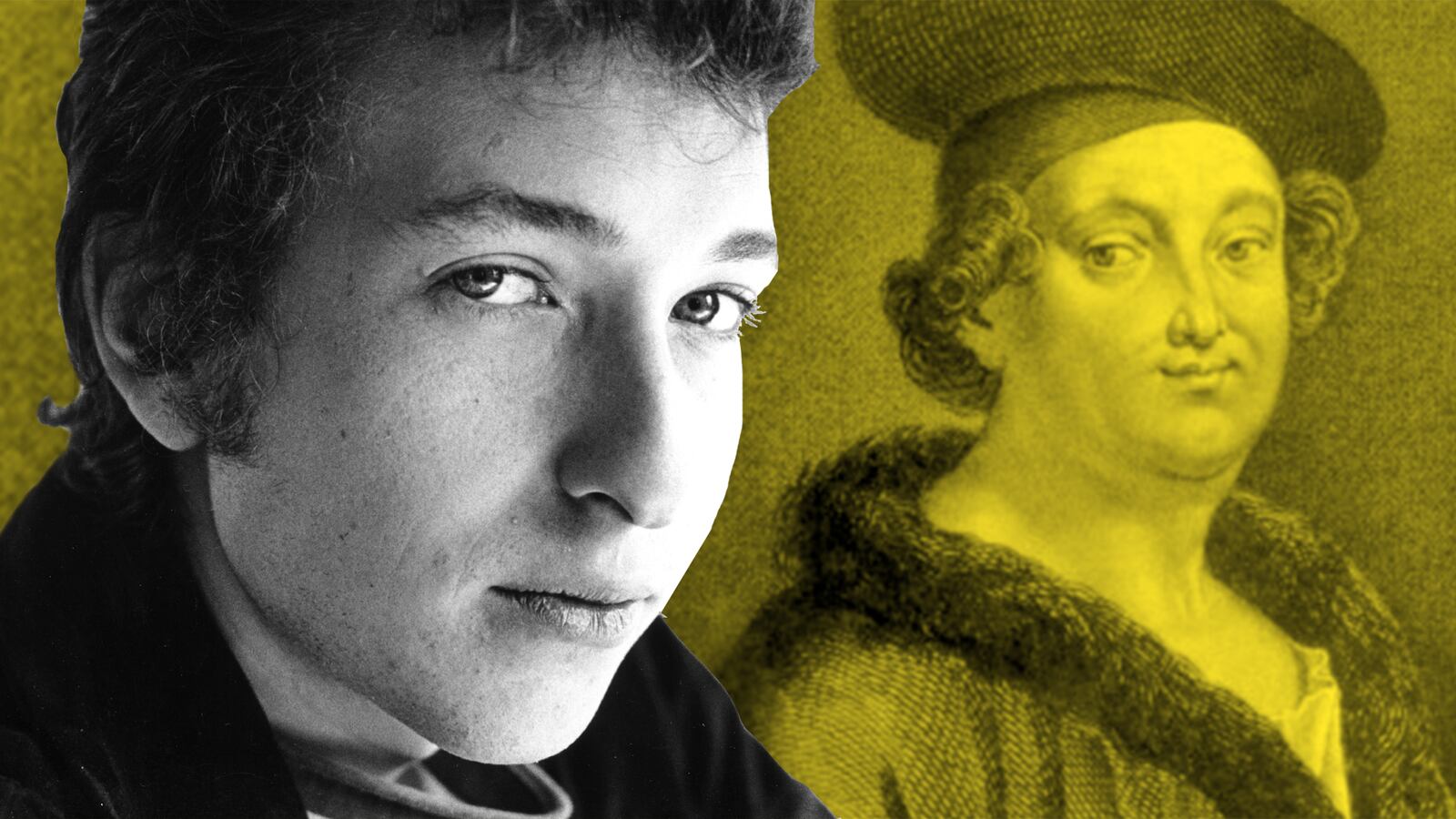The bleakest of Christmas poems was written 561 years ago in a drafty garret in the student ghetto of 15th-century Paris by a college student and petty thief.
“At Christmas,” wrote François Villon in his Little (or Lesser) Testament, “cold and bitter days/When wolves live on the wind./Within this house a person stays/By warming fires, the winter logs ablaze.”
Yes, you can feel the heat from that fire, but in the back of your mind, there’s the thought of that hungry wolf in the freezing wind right outside your door.
You won’t find many poems with lines about hungry wolves in Christmas cards, but then, Villon was not given to good cheer or reassuring thoughts. His poetry invariably took a sinister bend towards the macabre; gallows humor was practically his invention.
The known work of the poet called François Villon comprises little more than 3300 lines, 2000 of them in one long poem, The Great Testament. Most of his verse, at least that which has survived, is thought to have been written from December 1461 to the spring of 1462. The influence of this slender collection is almost immeasurable. It’s possible that nowhere else in literature have so many been influenced by so few words. More than five-and-a-half centuries later, Villon’s voice is heard in the work of last year’s Nobel laureate, Bob Dylan.
On the liner notes to his 1964 album, The Times They Are a-Changin’, Dylan told us that he wrote “with the sounds of François Villon echoin’ through my mad streets.” This makes sense. Villon’s most recent translator, David Georgi—who, in 2012, rendered the poems of the 15th-century Frenchman into American English—says, “Dylan was the voice I had in my head as I was trying to come up with a current English translation for Villon’s lines.”
We know little about Villon and are not sure even his real name. It might have been François de Montcorbier or François des Loges, both of which appear in court documents. He was probably born in 1431, the year of Joan of Arc’s death, in the neighborhood called the Celestins in the historic area of Marais. Author Alysa Salzburg, who visited Paris in 2007 looking for traces of the poet, found “streets lined with crooked, sooty buildings [that] accentuate the city’s past.”
The mad streets of the Paris he was born into still clung to the Middle Ages. English soldiers occupied the city. During a bitterly cold winter, famine drove city dwellers to cannibalism. A biographer, Aubrey Burl, wrote in Danse Macabre that when English troops left, “Only wolves came. There was no food in the barren fields, and every evening the ravenous animals swam across the river, packs of starving man-eaters that could smell the scent of a human being a quarter of a mile away, silently stalking their prey, man, woman or child, through the muddy streets of Paris.” (Fourteen adults and one child were reported killed by wolves that winter.)
There is no record of his father’s death; at age 7 his mother brought him to live with a chaplain, Guillanua de Villon, one of the few people who ever showed him kindness. François repaid him with immortality in The Greater Testament, calling him “plus-que-père”—“more than father.” He had some learning: a bachelor’s of arts degree (about the equivalent of a high school diploma today) and, later, a master of arts. His real education, though, came in the streets. As Ezra Pound put it, “He had the learning of the schools and the wisdom of the gutter.”
Villon was a lyric poet of breathtaking beauty and depth, but he was also the first great vernacular poet of the western world, a romantic but also a cynic capable of the kind of vulgarity that would cause a Victorian like Robert Louis Stephenson to recoil from his “evil, ironical temper.” (In Stephenson’s story “A Lodging for the Night,” a desperate Villon, seeking shelter on a winter’s night, passes the frozen body of a prostitute as a wolf howls. The poet is given refuge by a kindly man who hopes that Villon will “repent and change.” “I repent daily,” he replies.)
Villon ran with the worst criminal element in Paris; he robbed church boxes, pimped, and perhaps, though the evidence is slim, was even involved in a murder. His companions were pickpockets, barmaids, smugglers and gamblers—“coquillards” in the jargon of 15th-century Paris. Most of what we know about him comes from criminal court records. If he had not spent so much time in jail, we might know nothing about him at all.
His criminal activities resulted in his banishment from Paris in the year 1463 for the murder he probably did not commit, and from there he disappeared into myth—no trace of any kind was found.
His work lived on among a handful of devotees, and a quarter century after he left his beloved Paris, The Works of François Villon became one of the first truly popular books in western literature. We do not know if Villon lived to see it. In France, his poetry survived to influence Baudelaire—Paris Spleen would have been unthinkable without Villon—Verlaine, and Rimbaud, but not until Dante Gabriel Rossetti’s translation in 1867 did he become en vogue west of the English Channel.
His discovery by the English-speaking world is largely due to the pre-Raphaelites, particularly Rossetti, who took a line from Villon’s The Ballad of the Ladies of Bygone Times—“Mais où sont les neiges d’antan?”—and rendered it into English as “But where are the snows of yester-year?” (Rossetti may have coined the word yester-year.) And so, “By a single line of verse,” wrote William Carlos Williams, “in an almost forgotten language, Medieval French, the name of Villon goes on living defiantly.”
Many translators, some renowned poets themselves, have taken a crack at translating that line—most notably Algernon Swinburne (1905), Norman Cameron (1952) and Galway Kinnell (1965) —though to my ear Georgi’s interpretation rings truest: “Where’s the snow that fell last year?” As my poetry professor at the University of Alabama, Dr. Robert Penny, once wrote, “One line, a poem all poets wish was theirs.”
Why does the line continue to intrigue? My own answer is that that one line is a portal into Villon’s art—its dismissal of pious cant, its rejection of sentimentality, its mourning over the brevity and fragility of life and beauty.
No poet has ever written about the low-life of society with such insight and empathy. John Payne, a friend and contemporary of Rossetti, wrote “Before Villon, the language of the poets of the time had become pedantic … He restored the exhausted literary language of his time to youth and health by infusing into it the healing poisons, the revivifying acids and bitters of the popular speech… Villon was the first great poet of the people.”
By the 20th century, the legend of Francois Villon had branched off in two distinct directions.
In 1901, If I Were King by Irish politician and author Justin Hundly McCarthy begat the image of Villon as a lovable rogue who flitted from one romantic adventure to another. Adapted to the stage, If I Were King was a hit in both New York and London, and for the next couple of decades a bourgeois family favorite at holiday time that rivaled The Nutcracker. (The novel was the book that Francie Nolan keeps checking out of the library in A Tree Grows in Brooklyn.)
McCarthy’s work continued to morph. In 1925 it became the ultimate abomination, an operetta, The Vagabond King, which was filmed twice, 1930 and 1956. In 1938 the novel became a Hollywood feature film with Ronald Colman, directed by William Wellman.
Around the time McCarthy was bowdlerizing him for the amusement of families, a somewhat earthier Villon was inspiring Ezra Pound. Personae, published in 1909, contained several tributes to the Frenchman, including “Villon Aud For This Yule,” which pays homage to the bleak, black Christmas mood of Villon’s Little Testament. In the first stanza:
“Towards the Noel that morte saison/(Christ make the shepherds’ homage dear!)/Then when the grey wolves every chone/Drink of the winds their chill-beer…”
Pound’s lump of coal in the stocking “makyth my heart his Yule-tide cheer...”
(Pound would later write an opera, Le Testament de Villon, which made its debut in New York earlier this year after 93 years.)
Pound lit the lamp for the path for the poets of the counterculture. In The Threepenny Opera, in 1928, Bertoldt Brecht and Kurt Weil wrote song lyrics that were paraphrases, many of them grisly, from Villon. Brecht had earlier used Villon as a character in his play Baal. Villon was a patron to Jack Kerouac and the Beats, and from there to modern songwriters from Dylan to the Canadian Leonard Cohen (who was described in Time magazine as “like Villon with frostbite”) and punk priestess Patti Smith, whose line “Jesus died for somebody’s sins, but not mine” would surely have drawn a wry smile from him.
Most recently, Russian-born singer Regina Spektor set the words of a fellow Russian poet, Bulat Shalvovich Okudzhava, to music in Prayer of Francois Villon:
“While yet the Earth is revolving, While yet the daylight is broad, Lord, pray, give everyone Whatever they have in want: Give the wise one more brilliance, The coward a horse to flee, Give the happy some money… And don't forget about me.”
Meanwhile, Robert Louis Stephenson’s words, written in 1882, have proved prophetic: “If we measure [Villon] not by priority of merit but living duration of influence… we shall install this ragged and disreputable figure in a far higher niche in glory’s temple than was ever dreamed of by the critic.”
Across hundreds of years and thousands of miles, the link between Villon and our time is strong, particularly this time of year to those who hear the wolves howl.





